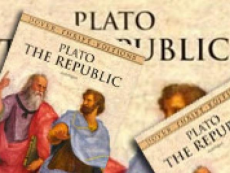
Email: ZYVC057@live.rhul.ac.uk
Total Article : 213
About Me:I'm a graduate student studying International Criminal Law and first started writing for King's News almost 4 years ago! My hobbies include reading, travelling and charity work. I cover many categories but my favourite articles to write are about mysteries of the ancient world, interesting places to visit, the Italian language and animals!

Plato's work The Republic describes the ideal of justice and outlines an ideal city state from that. Justice is ancient virtue, not at “act virtue” which can be achieved by conforming our actions with just behaviour. The act of being just is empirical - it is observable - but justice is an ancient virtue, a quality of the individual’s soul, part of their character. An unjust person would comply to just actions as long as it suited him. Plato wants to demonstrate that justice is part of soul but he cannot observe it directly, hence throughout the Republic Plato delves into exploring what the soul truly is.
Book one of The Republic:
The Republic is a workout dialogue, some theorise that book one was written early as it stands as a separate argument. The book opens as Cephalous and Socrates discuss about age and Cephalous feels he has nothing to fear in dying, seeing as only bad people are worried about death Socrates asks him what justice is for him. Cephalous says he is tired and retires to bed, the discussion tehrefore continues with three others. The first definition of justice is an act virtue, a just man never breaks his word. Socrates contradicts this by supposing there is a good reason to break a promise, to go against your word. For example, you may keep a gun if your friend wants it back to shoot. Justice is therefore not staying true to word.
Justice then is a good guardian. To be a good guardian one must be a good protector, to do that you have to anticipate a thief’s moves, thus you have to be like a good thief. Nobody openly contradicts this theory so the argument has nowhere to go anymore. This is when a famous sophist sitting in the corner objects in a way which carries the argument forward. He insults Socrates. Socrates wanted to make the weaker argument stronger, without giving an answer. The sophist starts with one definition of justice then changes it. For him justice depends on strength, justice is for the strong, it is a dictator’s idea of justice, justice is opposed on everyone though force.
Socrates suggests that if ruling is a craft, a skill, then every craft benefits its object. If ruling is about other people it benefits other persons. The same is valid for a ruler as he moves on self-interest. The sophist has a long monologue but eventually slips up and makes a mistake by saying that only an idiot would be just. He drops his sceptical argument, he is written to drop it by the author Plato who coordinates the actions of each character in the book. Socrates starts making his argument based on analogies. Socrates tries to say it is inconsistent to align justice with other values. Wise people only try to get the better of the mass, they respect other intellectuals. If the wise only try to get the better of the unwise, the just person only tries to get the better of the unjust people. The unjust tries to get the better of everyone. Just people can cooperate with each other as they don’t try to harm the just, thus they form a stronger tie than the unjust, who just try to get the better of everyone. Every part of us has a function and justice is the virtue of the soul. Everyone in the room agrees and book one draws to an end.
Image: http://www.open.edu/openlearn/sites/www.open.edu.openlearn/files/styles/share_img/public/imported/2323/republic_rhs.jpg?itok=3ve6-Lfv

0 Comment:
Be the first one to comment on this article.